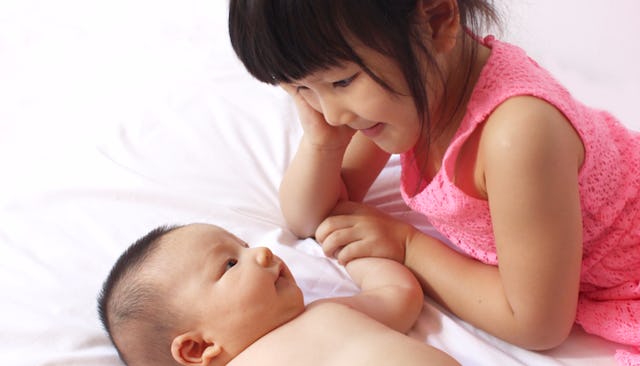Study Finds The Oldest Child Is Actually The Smartest

Turns out, the stereotypes are correct
Firstborn children are smarter – and according to a new study, there’s a reason for that.
TODAY reports that new research finds parents give the same amount of love and care to all of their children, but firstborns get a little boost in the brain department. They get more mental stimulation, and with each subsequent child, that level of engagement drops off. The study also found that parents spend less time reading to their other children and teaching them basic concepts, like the alphabet. They also don’t offer as many engaging toys or activities.
The new research found that firstborn children are raised for more academic and intellectual success very early on. According to the study published in the Journal of Human Resources,”a broad shift in parenting,” is likely the reason firstborn babies and toddlers score better on cognitive tests than their younger siblings at the same age.
“First-time parents tend to want to do everything right and generally have a greater awareness of their interactions with and investments in the firstborn,” says Jee-Yeon K. Lehmann, an economist with the Analysis Group in Boston and co-author of the study. “With each subsequent child, parents tend to relax to a greater extent what they might deem as non-essential needs for their kids.”
Additionally, the study debunked the myth that birth order shapes a child’s personality. Lehmann and her colleagues found that there is no impact on a child’s temperament, except that firstborns seemed more confident in their academic performance.
As a parent, think of how obsessed you probably were with teaching your firstborn child their ABC’s, colors, and shapes, versus your second or even third, fourth, or fifth child. The novelty wears off after awhile. Not to mention, keeping up with the demands of parenting with each subsequent child is just plain exhausting.
“The lesson here for parents is that the types of investments that you make in your kids matter a lot, especially those that you make in the children’s first few years of life, “Lehmann says. “All those learning activities that you did with your first child as excited, nervous and over-zealous parents actually seem to have some positive, long-lasting impact on their development.”
No offense to the researchers, we’re sure they’re all brilliant firstborn children, but anyone currently living out modern parenthood could’ve attested to this phenomenon. We face more limits on our time and resources than any other generation before us. One needs to only look at the high-stress of corporate America and the lack of support for our families (ahem, no federally mandated paid leave for parents) to see why this is happening.
Whether we mean to or not, this study points to a stark reality; we’re adjusting our parental behaviors and attitudes to keep the hell up with life, and it could be negatively impacting our kids.
Well, at least the non-firstborn ones.
This article was originally published on